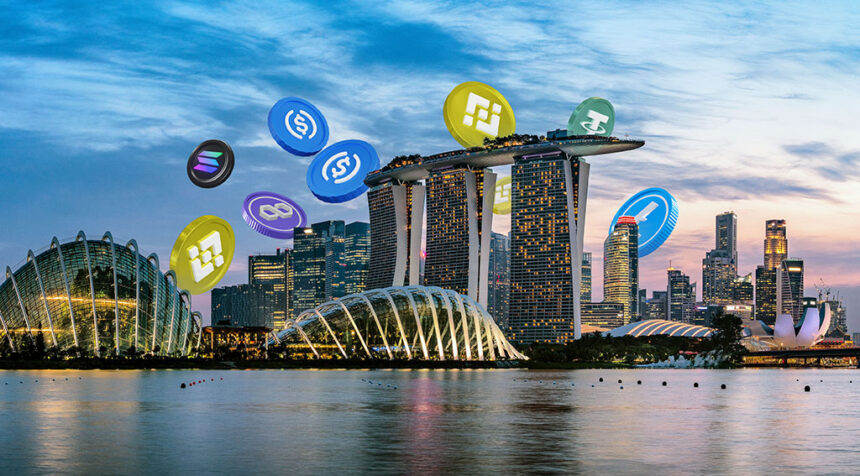Singapore, long recognized for its financial acumen and technological advances, is making a calculated bet on its financial future through tokenization.
City-states are proactively embracing the complexities of the digital asset revolution, rather than avoiding it. Embracing the potential of tokenization and cryptocurrencies.
Led by the Monetary Authority of Singapore (MAS), this proactive approach aims to strengthen the country’s financial infrastructure.
The goal is to attract investment and innovation, maintain Singapore’s competitiveness on the world stage, and expand financial inclusion.
However, embracing this new thing is not without its cautious aspects, as Singapore carefully balances innovation with robust regulation and consumer protection.
Singapore unlocks value with tokenization
Central to Singapore’s strategy is promoting the tokenization of assets.
This process converts real-world assets such as bonds, stocks, and even real estate into digital tokens and is expected to: Freeing liquidity, increasing efficiency and reducing transaction costs in financial markets.
Tokenization has the power to revolutionize the way financial products are traded, making transactions as quick and easy as sending a text.

project guardian
To realize Singapore’s tokenization efforts, MAS has actively facilitated development through: project guardian.
This is an ambitious initiative that brings together leading financial institutions, industry associations, and international policymakers from seven jurisdictions.
Under this initiative, more than 15 industry trials were conducted across six currencies and multiple financial instruments, demonstrating the feasibility and potential of tokenization in capital markets.
The trial explored use cases ranging from foreign exchange (FX) to debt capital markets, providing valuable insight into real-world implementations and challenges of tokenization.
guardian wholesale network
Building on these successes, MAS is promoting the formation of commercial networks such as: guardian wholesale network.
Comprised of industry giants such as Citi, HSBC, Schroders, Standard Chartered and UOB, the network aims to expand the use of tokenized assets and increase market liquidity.
By connecting different platforms and services, we aim to enhance accessibility, improve price discovery, and reduce fragmentation in the tokenized asset market.
Global Layer One Initiative
But Singapore’s ambitions extend beyond its borders.
Launched in 2023 by MAS, Global Layer 1 (GL1) Initiative It aims to facilitate the development of the underlying digital infrastructure that can support seamless cross-border transactions of tokenized assets.
Importantly, this effort is essential to establishing a robust and interoperable ecosystem in which tokenized assets can be traded securely and efficiently across different jurisdictions.
GL1 is more than just a technical endeavor. It also addresses important aspects of governance, risk management and compliance.
A core group of global banks including BNY, Citi, JP Morgan, MUFG, Societe General Forgehas led the effort to define the business, governance, risk, legal, and technology requirements for the GL1 platform.
To further strengthen this foundation, the scope of GL1 has expanded to include management principles, market infrastructure and asset lifecycle specifications, and the development of compliance-by-design templates to accelerate new participant onboarding. It has been.
With the addition of new industry participants such as Euroclear and HSBC, GL1 is building a true collaborative foundation for the future of tokenized asset trading.
Tokenization framework in Singapore
Alongside these efforts, MAS recognized the importance of establishing clear guidelines and standards for asset tokenization.
To facilitate widespread acceptance and adoption by financial institutions, MAS has published two key frameworks developed by members of the Project Guardian industry group. Guardian Fixed Income Framework (GFIF) and Guardian Fund Framework (GFF).
GFIF is A comprehensive industry guide to implementing tokenization in debt capital markets.
Integrating existing standards from organizations such as the International Capital Markets Association (ICMA), the Capital Markets Technology Association (CMTA), and the Global Financial Markets Association (GFMA) to strengthen industry capabilities and introduce tokenized fixed income solutions promote.
GFF, on the other hand, focuses on tokenized funds. Provide a set of recommendations on industry best practices.
This includes the Guardian Composable Token Taxonomy, designed to facilitate the development of tokenized investment vehicles composed of multiple assets.
GFF aims to simplify the process of incorporating new tokenized funds and achieve efficiency in fund settlement.

Countries embracing digital transformation
Singapore’s strategic adoption of tokenization and cryptocurrencies is due to a confluence of factors that positions Singapore as a natural leader in this emerging field.
country It boasts a world-class technological infrastructure and a population with both technical and financial knowledge.creating fertile ground for fintech and cryptographic innovations to flourish.
Additionally, Singapore is strategically located as a gateway between East and West. Attracting numerous international cryptocurrency companiesenriching local ecosystems with expertise and investment.
Complementing these unique advantages is MAS’ proactive and balanced regulatory approach.
This provides clarity and legitimacy to the cryptocurrency industry, while also protecting the interests of consumers.
The Payment Services Act of 2020 brought cryptocurrency businesses under regulatory scrutiny, and subsequent amendments further strengthened user protection and financial stability requirements.
Initiatives like FinTech regulatory sandbox It has fostered a culture of innovation by allowing companies to experiment with new financial products and services.
Such an approach has attracted significant investment and positioned Singapore as a center of cutting-edge development in the digital asset space.
Overcoming challenges requires balance
While Singapore is making strides in the digital asset space, it also recognizes the challenges ahead.
The global nature of cryptocurrencies creates regulatory hurdles, particularly in areas such as: Anti-Money Laundering (AML) and Combating the Financing of Terrorism (CFT).
Balancing the need for innovation with a robust regulatory framework remains a key priority for MAS.
The volatility of the cryptocurrency market is another concern.
As a result, MAS Strict guidelines for public service announcements To protect retail investors from potential risks associated with cryptocurrency trading.
Educating the public about these risks and ensuring responsible trade practices is critical to maintaining market confidence.
A calculated bet on Singapore’s future
Singapore’s push to commercialize tokens and cryptocurrencies is a calculated bet and a strategic bet on its financial future.
By fostering a supportive environment for digital assets, fostering industry collaboration and implementing a strong regulatory framework, Singapore is positioning itself as a leading force in the global digital asset revolution.
This commitment to innovation, coupled with a smart approach to risk management and consumer protection, sets an example for other countries looking to navigate the complexities of the digital asset landscape.
As the world embraces the transformative potential of tokenization and cryptocurrencies, Singapore is poised to shape the future of finance and solidify its position as a global financial hub.
Featured image credit: Edited from freepic









